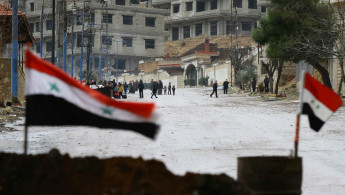Syria approves UN aid deliveries to besieged villages
The Syrian government has approved a United Nations request for new aid deliveries to the besieged towns of Madaya, Fuaa and Kfarya where hundreds of civilians are facing severe malnutrition and some have starved to death.
The UN humanitarian office announced the approval on Monday, as talks aimed at ending the nearly five-year Syrian conflict started in Geneva between the government and opposition.
Aid deliveries to the three villages had been blocked until about three weeks ago when trucks from the UN and other humanitarian organisations were allowed to enter.
Madaya, a town northeast of Damascus with a population of 40,000 that has been besieged by government and allied militiamen for months, gained international attention after harrowing pictures emerged showing emaciated children.
Aid workers who entered the town last month described seeing skeletal figures, children who could barely talk or walk, and parents who gave their kids sleeping pills to calm their hunger.
The international aid group Doctors Without Borders said on Friday that 16 people have died in Madaya since the relief convoys began arriving on January 12, citing health workers affiliated with its operations.
The group, also known by its French initials MSF, reported 320 cases of malnutrition and said 33 of those people "are in danger of dying if they do not receive prompt and effective treatment."
In the villages of Fuaa and Kfarya in the northern Idlib province, which have been blockaded by rebels for more than a year, recently evacuated pro-government fighters described desperate conditions.
They said people in the villages, with a combined population of around 20,000, had little food and medicine and some were eating grass to survive and undergoing surgery without anesthesia.
The three villages are among over a dozen other besieged communities across Syria, with more than 400,000 people, according to United Nations estimates.
Roughly half of them are in areas controlled by the Islamic State extremist group whose fighters occupy about a third of Syria.
In 2014, the United Nations was able to deliver food to about five percent of people in besieged areas, but the latest UN humanitarian reports estimate that less than one percent are being reached.
UN Secretary-General Ban Ki-moon has called the deliberate starvation of civilians a "war crime." He urged both the Syrian government and rebels to end the sieges before peace talks started which didn't happen.
But the main opposition coalition kept up its demand for humanitarian aid to the needy at the Geneva talks on Monday.
The UN Office for the Coordination of Humanitarian Affairs said it will submit a detailed list of supplies to be delivered to Madaya, Fuaa and Kfarya to follow up on Monday's approval of new convoys by the government.
OCHA said the UN will also reiterate a request, which has not yet been approved, for experts to go to the three villages to assess health and nutrition needs.





 Follow the Middle East's top stories in English at The New Arab on Google News
Follow the Middle East's top stories in English at The New Arab on Google News
![The UAE is widely suspected of arming the RSF militia [Getty]](/sites/default/files/styles/image_330x185/public/2024-11/GettyImages-472529908.jpg?h=69f2b9d0&itok=Yauw3YTG)
![Netanyahu furiously denounced the ICC [Getty]](/sites/default/files/styles/image_330x185/public/2024-11/GettyImages-2169352575.jpg?h=199d8c1f&itok=-vRiruf5)
![Both Hamas and the Palestinian Authority welcomed the ICC arrest warrants [Getty]](/sites/default/files/styles/image_330x185/public/2024-11/GettyImages-2178351173.jpg?h=199d8c1f&itok=TV858iVg)